SQL
Description
SQL expression allows one to express the processing of one or more SQL statements.
For connection setup, visit Database Connection Setup for more detail.
Execution Result of Queries
The resultName parameter used in the operations below refers to the Execution Result
of the SQL queries. It is the variable associated with the query result that we can assign using the syntax
--nexial:resultName as shown in the examples below.
In cases where there is no variable specified corresponding to the query, Nexial, by default uses 0-based index to refer to
execution outcome of that particular query.
For Example
Our student table looks like this

We write multiple queries into a single variable and assign only one of them a variable.

As stated before, where there is no variable assigned to the query, nexial by default used a 0-based index. We use the index 0
to address the outcome of this query.


Similarly, we use the index 1 for the second query


We assigned a variable to the third query, so we’ll use that. Alternatively, we can use the index 2.


Using index 3 for the last query


The resulting student table looks like this after running the queries.
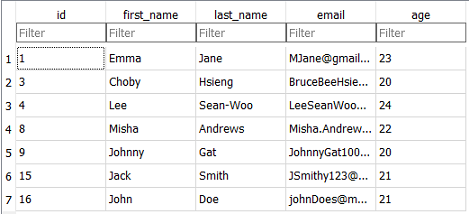
If the query contains errors
Normally, the execution outcome of a query would contain various pieces of information as shown in the pictures below.
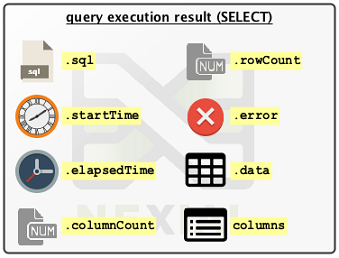
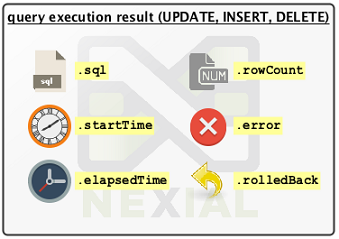
However, in case of inaccurate or erroneous queries.

The execution outcome will return an error upon running the execute and running other operations on the outcome will return
either 0 or null.

Output:

However, some meaningful information can be extracted the execution outcome of an erroneous query. For example

Output:

Referencing Queries in External File
Nexial built-in functions, data variables and expressions can also be used in the SQL queries. For Example:
select * from ${table}; where table is:
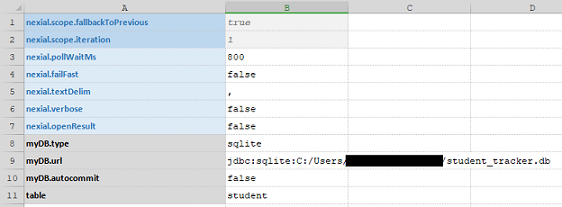
SQL queries can either be written directly into the script or can be stored in a file and run. However, writing queries in a file has the following advantages:
- Ease of readability compared to queries written directly into the script
- Better flexibility in terms of modification since the queries are separate from the script.
- Externalized queries provide for ease of maintenance and reusabilty.
- Queries written in a file also can make use of built-in functions, data variables and expressions.
As a best practice, the file(s) containing the queries should be stored under the data or the script directory as it helps with portablity.
Operations
cell(resultName,row,column)
Return the value of a specific cell (row + column) from an execution result named resultName. Must be invoked
only after execute().
- The
resultNamecan either be the name given to the corresponding result or its index (the nth resultset). - The
rowparameter refers to the row index of the target resultset. Note thatrowis zero-based. - The
columnparameter refers to the column name of the target resultset.
As for result:
- Note that if
roworcolumnis not valid, Nexial will throw an exception. - If the resolved value is a number, then a
NUMBERexpression will be returned. - If the resolved value is a binary or byte array in nature, then a
BINARYexpression will be returned. - All else, a
TEXTexpression will be returned.
cells(resultName,column)
Return a list of data matching column.
Example
Existing Database:

Script: Fetching the entries in the first_name column

Output:

columnCount(resultName)
Returns the number of columns for a given execution result named resultName.
Must be invoked after execute().
Example
Database:

Script:

Output:

columns(resultName)
Returns the column names of an execution result named resultName. Must be invoked after execute().
Example
Database:

Script:

Output:

csv(resultName)
Transform the content of execution result named resultName to CSV.
Must be invoked after execute().
Example
Database:

Script:

Output:
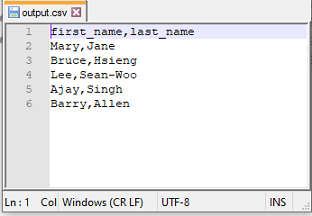
elapsedTime(resultName)
Returns amount of milliseconds to execute and retrieve an execution result named
resultName. Must be invoked after execute().
Example
Database:

Queries:
insert2.sql

update.sql

Script:

Output:

Resulting Database:

error(resultName)
Returns any error, as TEXT, incurred during the execution and
retrieval of an execution result named resultName. Must be invoked after execute().
Example
Script:

Output:


execute(db)
Execute the associated SQL statement(s) using db as the database connection. Most of the operations mentioned below must
be preceded by execute(db) as a requirement. `
Example
Database:
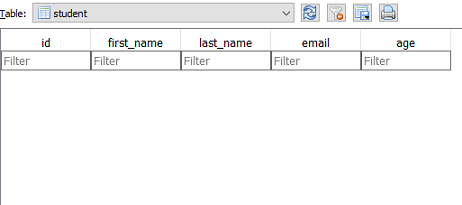
Script: Inserting new tuples into the table

Output: Insertion successful

Output: Insertion failed. Nexial prints the query as the output.

resultCount
Find out the number of execution results rendered through the most recent execute()
operation. Must be invoked after execute().
Example
Database:

Script: Running a single select query.

Output:

SQL File: operation.sql

Script: Running multiple queries

Output:

Resulting Database

rolledBack(resultName)
Returns true/false value if the execution and retrieval of an execution result
named resultName has caused a roll back event. Must be invoked after execute().
Example
Database:

SQL file: insertRollback.sql

Script:

Output:

Resulting Database:

row(resultName,rowIndex)
Transform one row (denoted by rowIndex) from the specific result (denoted by resultName) as a
LIST expression. Must be invoked after execute().
Note that any invalid row reference (less than zero or greater than available row) will result in an empty
LIST.,
rowCount(resultName)
Returns the number of rows for a given execution result named resultName. Must be invoked after execute().
Example
Database:

Script:

Output:

sql(resultName)
Returns the SQL statement used to derive an execution result named resultName. Must be
invoked after execute().
Example
SQL File: update.sql

Script:

Output:

Resulting Database

startTime(resultName)
Returns the time, in epoch, when the execution of a result named resultName was
started. Must be invoked after execute().
Example
Script:

Output:

store(var)
Store the current state of this expression for later use.
Example
Database:

Script:

Output CSV:
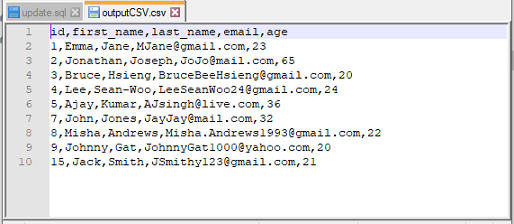
text
Transform the associated SQL statement(s) into plain text.
Example
Script:

Output:

Text File: output.txt
